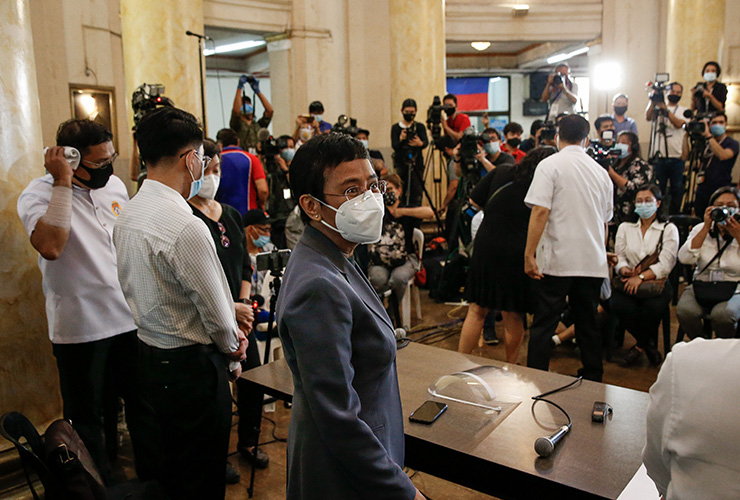[separator style_type=”single” top_margin=”20″ bottom_margin=”20″ sep_color=”#c4c4c4″ border_size=”” icon=”” icon_circle=”” icon_circle_color=”” width=”25%” alignment=”center” class=”” id=””]
The conviction of journalist and IPI Executive Board member Maria Ressa is highly deplorable and marks a sad day for press freedom in the Philippines, the International Press Institute (IPI) said.
The Manila Regional Trial today convicted Ressa, CEO of the news website Rappler, and former Rappler writer Reynaldo Santos Jr. on charges of cyber libel. Rappler itself, which was also a defendant in the case, was found not to be liable. In issuing the ruling, the judge stated that freedom of the press cannot be used as a shield against libel.
The court sentenced Ressa and Santos to a minimum of six months and one day to a maximum of six years in prison. They were released on bail pending appeal. Ressa and Santos were also each ordered to pay 200,000 Philippine pesos (approximately 3,500 euros) in moral damages and 200,000 pesos in exemplary damages.
“On behalf of the IPI Executive Board, I deplore the convictions of my fellow IPI Board member Maria Ressa and Reynaldo Santos. This is a sad day for journalism and press freedom not only in the Philippines but around the world”, IPI Executive Board chair Markus Spillmann said. “Let us be clear: Maria Ressa has been convicted for her fearless journalism and speaking truth to power. This ruling serves as a warning to all independent journalists in the country.”
He added: “The global IPI community stands behind Maria Ressa and we will support her fight for justice and for the right to do her work freely.”
Ressa and Reynaldo will not go to prison at this time, as the conviction can be appealed and have the option to exhaust legal remedies in higher courts.
The cyber-libel case against Ressa is based on an investigative report published by Rappler on May 2012. The article said that the then-chief justice of the Philippines Supreme Court, Renato Corona, had used vehicles belonging to a controversial businessman. The article was republished on February 2014, to correct a spelling error, which is a normal practice of news publications.
In February last year, the Department of Justice (DOJ) arrested Ressa and filed charges against her, reporter Reynaldo Santos Jr. and Rappler Inc. under the Cybercrime Prevention Act, which was enacted on September 2012, four months after the publication of the original report in Rappler. The charges stemmed from a complaint by the businessman, Wilfredo D. Keng. Authorities initially declined to prosecute the case, but later reversed that decision.
In the court, the prosecution argued that the republication of the article in 2014 to correct a “typo” amounted to republication of the story and therefore the cyber libel law could be applied.
Maria Ressa and Rappler have been for years targets of President Duterte, who has made false allegations against the media organization and accused it of being funded by foreign agencies seeking to destabilize his government. The targeting of Rappler started in 2016 with exponential online attacks on social media and later continued with arrests and legal harassment.
At the moment, there are a total of eight cases pending against Ressa and Rappler, including three tax cases, charges for violating foreign ownership rules and an alleged violation of nationality law (“anti-dummy law”). She faces nearly 100 years in prison across all cases.
